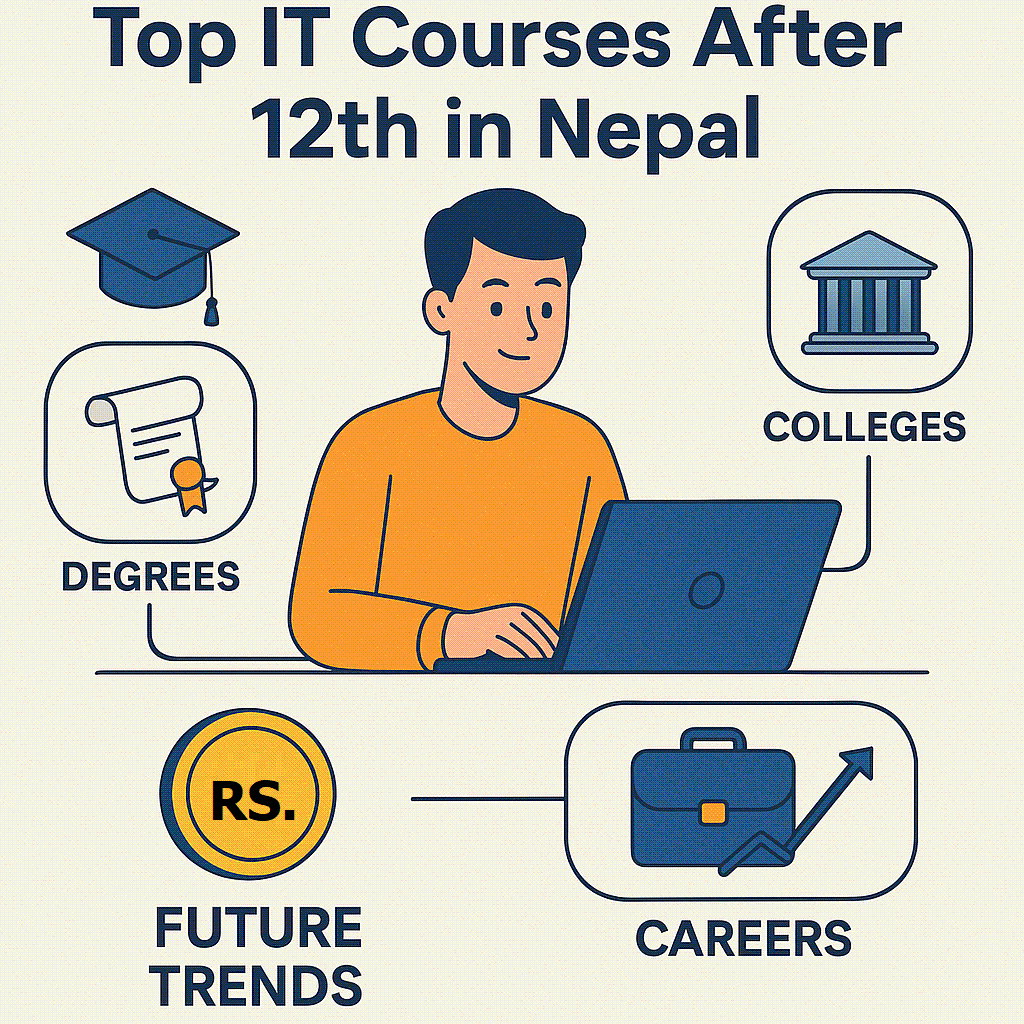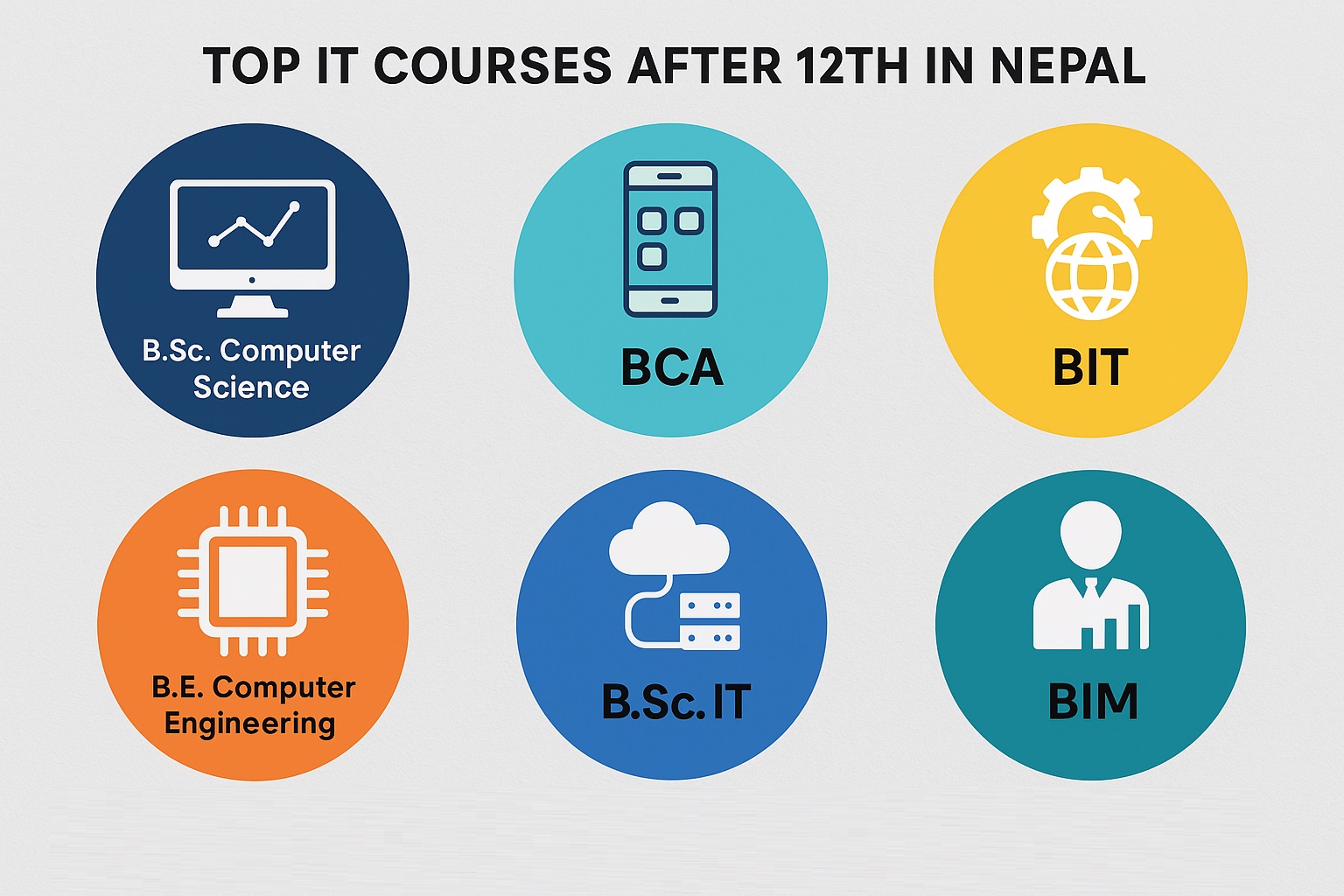
Choosing what to study after 12th grade can be confusing. With so many options and growing pressure to ‘choose wisely,’ it’s easy to feel stuck. But if you’ve ever found joy in fixing computer issues, experimenting with code, or even wondering how apps work, IT might be more than just a career option—it could be your space to thrive.
Nepal is shifting—slowly but steadily—toward digital systems. Walk into any government office, bank, or business hub, and you’ll see the change. Most of them now rely on digital platforms to store data, communicate, or manage operations. But who builds these systems? Who maintains and improves them? That’s where skilled IT professionals step in.
I remember watching my cousin debug a program at midnight during his final year in BSc CSIT. He was frustrated but focused. That project helped him secure his first job a few months later. He didn’t have to go abroad. He worked from his room, earning dollars, and slowly built a client base. Stories like his aren’t rare anymore—they’re becoming common.
So, if you're still unsure, think of this guide as a friendly conversation with someone who's been there. We’re about to explore which IT courses in Nepal make sense, what they lead to, and how you can make an informed choice—without the pressure.
Table of Content
- Why Choose IT After 12th in Nepal
- Key Considerations Before Choosing an IT Course
- Most Popular IT Courses After 12th in Nepal
- Other IT Programs to Know
- A Quick Comparison: What You’ll Learn and Where You’ll Go
- What Jobs Can You Expect?
- Colleges That Stand Out
- The Skills That Give You an Edge
- Where Nepal’s IT Sector Is Headed
- Final Thoughts
- FAQs
Why Choose IT After 12th in Nepal
Nepal’s Shift to Digital and What It Means for You
It’s no secret that Nepal is becoming more digitally active. From school portals to online payments, everyday services now depend on technology. According to a 2025 report from AITC International, the tech sector ranks among the top three hiring categories in the country. That means more jobs, internships, and freelance gigs waiting for those with the right skills.
A Degree with Global Potential
What you learn here doesn’t stay limited to Kathmandu or Pokhara. IT knowledge travels. It opens doors to global clients, foreign universities, and remote work opportunities. You don’t need to relocate to find growth—you need a laptop and the proper skill set.
Institutions and Policy Support
The government’s ‘Digital Nepal’ plan is more than paperwork—it’s influencing how schools teach, how offices work, and how youth are being trained. Colleges are responding with upgraded labs and more relevant IT syllabi.
Key Considerations Before Choosing an IT Course
What Makes You Curious?
Are you drawn to building apps, breaking down problems, or managing data? That little spark matters. Let your curiosity guide you, because different courses suit different goals.
What’s in the Curriculum?
A syllabus isn’t just a list of subjects—it tells you how hands-on your learning will be. Some courses focus on coding; others touch management, security, or teaching. Choose what you’d like to spend hours practicing.
Who’s Teaching and Where?
Some colleges shine because of strong mentors, active alumni, and updated labs. Walk around campuses. Ask students about their experience. Sometimes a 10-minute chat tells you more than a brochure ever could.
Is It Practical Enough?
A solid IT course should include projects, internships, and case studies. You might miss out if you’re not building or applying your skills by the second year.
Most Popular IT Courses After 12th in Nepal

BSc in Computer Science and IT (CSIT)
This one’s for the problem-solvers. Expect four years of deep work in data structures, programming, and systems. Many graduates step into development roles, tech support, or analytics.
Bachelor of Information Technology (BIT)
BIT is practical. You learn by writing code, designing systems, and exploring databases. Students often graduate with hands-on experience and are job-ready.
Bachelor of Computer Application (BCA)
Think applications. BCA is great if you like building things people use, such as mobile apps, software tools, or web interfaces. Courses include Java, .NET, and user-friendly tech stacks.
Bachelor of Computer Engineering (BCE)
This one blends hardware and software. You’ll study robotics, system architecture, and coding logic. A good pick if you love fixing things and understanding how they tick.
Bachelor of Information Management (BIM)
Tech meets business here. BIM helps you understand how companies use IT to improve performance. Graduates often work as analysts, consultants, or project leads.
BSc (Hons) Computing
If you're aiming for a global degree, this three-year program, offered through UK affiliations, covers various topics, from software development to basic AI concepts. It’s compact but intense.
BSc (Hons) in Cybersecurity and Digital Forensics
Are you interested in solving digital crimes? This course focuses on ethical hacking, cyber threats, and forensic investigations. It is for those who want to protect data and systems.
Other IT Programs to Know
-
BBIS teaches you how tech supports business functions. Perfect for future IT managers.
-
BEIT leans more toward tech-heavy topics like computing, logic, and infrastructure.
-
BSc in Computer Science is rich in theory and logic, great for those eyeing research roles.
-
BEd in ICT suits those who love both tech and teaching. It preps you for classrooms and curriculum design.
A Quick Comparison: What You’ll Learn and Where You’ll Go
| Course | Duration | Focus | Careers |
|---|---|---|---|
| BSc CSIT | 4 yrs | Programming, OS | Developer, Analyst |
| BIT | 4 yrs | Software, Systems | Web Dev, Engineer |
| BCA | 4 yrs | Apps, Web Tools | App Developer |
| BCE | 4 yrs | Hardware + Code | Systems Engineer |
| BIM | 4 yrs | Tech + Business | Project Manager |
| BSc (Hons) Comp | 3 yrs | Global Curriculum | Software Dev |
| Cybersecurity | 3 yrs | Security, Forensics | Cyber Analyst |
What Jobs Can You Expect?
-
Software Developer
-
Web Designer
-
Cybersecurity Analyst
-
IT Consultant
-
Database Manager
-
Network Administrator
And the pay? It varies, but here’s a rough idea:
Salary Ranges for IT Professionals in Nepal
|
Job Title |
Entry-Level Salary (NPR/month) |
Mid-Level Salary (NPR/month) |
|
Software Developer |
25,000 - 40,000 |
50,000 - 80,000 |
|
Web Developer |
20,000 - 35,000 |
40,000 - 70,000 |
|
Data Analyst |
25,000 - 45,000 |
60,000 - 90,000 |
|
Network Administrator |
20,000 - 35,000 |
45,000 - 70,000 |
|
Cybersecurity Analyst |
30,000 - 50,000 |
60,000 - 100,000 |
|
IT Support Specialist |
15,000 - 30,000 |
35,000 - 60,000 |
|
Database Administrator |
25,000 - 40,000 |
50,000 - 80,000 |
|
IT Project Manager |
40,000 - 60,000 |
80,000 - 150,000 |
|
AI/ML Engineer |
30,000 - 60,000 |
80,000 - 130,000 |
|
Software Engineer |
25,000 - 150,000 |
30,000 - 110,000 |
|
System Analyst |
30,000 - 120,000 |
35,000 - 120,000 |
|
Business Analyst |
20,000 - 120,000 |
45,000 - 120,000 |
|
Product Manager |
35,000 - 90,000 |
N/A |
|
Network Engineer |
25,000 - 80,000 |
N/A |
Side gigs and freelance work are common; too many students earn while studying by taking on projects remotely.
Colleges That Stand Out
Public
-
IOE Pulchowk
-
Kathmandu University
-
Padma Kanya Campus
Private & Affiliated
-
The British College
-
Islington College
-
Softwarica College
-
Kantipur City College
Before enrolling, visit campuses, ask questions, and check alumni stories. What works for someone else may not work for you.
The Skills That Give You an Edge
Technical Must-Haves
-
Coding (Python, C, Java)
-
Database Handling
-
Networking Basics
-
Cyber Defense Tools
Soft Skills That Matter
-
Communication
-
Time Management
-
Teamwork
-
Problem-Solving
Short Courses That Help
-
Google IT Support
-
Cisco Certifications
-
CompTIA Security+
True Stories from the Field
A BCA graduate, Suman launched a note-sharing app during his final year. Today, it has over 15,000 downloads. His startup is now hiring.
Sneha studied BSc CSIT. Her final project—an AI quiz tool—earned her a job offer from a local ed-tech firm before graduation.
Real projects, internships, and consistent practice often open doors more than scores alone.
Where Nepal’s IT Sector Is Headed
Cybersecurity is gaining ground. Every business wants protection from threats, so specialists in this area are in demand.
Cloud computing is replacing traditional servers. If you can manage digital storage and security, you're already valuable.
App development continues to boom. With new startups and international clients hiring remotely, there’s plenty of room for growth.
Automation and workflow tools are helping businesses run smarter. You will likely stand out if you learn how to build these tools.
Final Thoughts
You don’t need to be a tech genius to enter IT. You need interest, consistency, and a place to begin. IT isn’t a shortcut to success but a path that rewards those who stay curious and keep building.
Pick a course that fits how you think, not what others expect. Learn deeply, practice often, and talk to those ahead of you. That’s how you figure out what works. And if you start today, who knows where you’ll be in a few years?
FAQs
Which course gives better job options?
BSc CSIT and BCA tend to offer the most direct routes into jobs.
Can I study IT if I’m from management?
Yes, BCA and BBIS may accept students from non-science backgrounds.
How expensive are these programs?
Fees range between NPR 100,000 to 800,000 depending on college and affiliation.
Do I need to go abroad for a tech job?
No. Many work with international firms from Nepal itself.
Where should I apply?
Apply based on course fit, faculty quality, and real-world exposure—not just location or brand.
Study in Nepal

